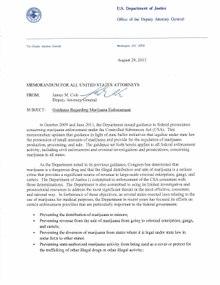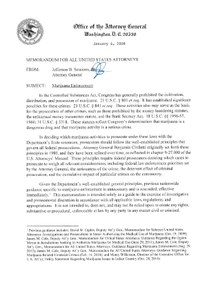
Jefferson Beauregard Sessions III is an American politician and attorney who served as the 84th United States attorney general from 2017 to 2018. A member of the Republican Party, he previously served as United States senator from Alabama from 1997 to 2017 before resigning that position to serve as attorney general in the administration of President Donald Trump. Trump fired Sessions in 2018 due to his inaction and recusal from the Russian collusion probes.

In the United States, the removal of cannabis from Schedule I of the Controlled Substances Act, the category reserved for drugs that have "no currently accepted medical use", is a proposed legal and administrative change in cannabis-related law at the federal level. After being proposed repeatedly since 1972, the U.S. Department of Justice initiated 2024 rulemaking to reschedule cannabis to Schedule III of the Controlled Substances Act. The majority of 2024 public comments supported descheduling, decriminalizing, or legalizing marijuana at the federal level.

In the United States, the non-medical use of cannabis is legalized in 24 states and decriminalized in 7 states, as of November 2023. Decriminalization refers to a policy of reduced penalties for cannabis offenses, typically involving a civil penalty for possessing small amounts, instead of criminal prosecution or the threat of arrest. In jurisdictions without penalty the policy is referred to as legalization, although the term decriminalization is sometimes used for this purpose as well.

In the United States, increased restrictions and labeling of cannabis as a poison began in many states from 1906 onward, and outright prohibitions began in the 1920s. By the mid-1930s cannabis was regulated as a drug in every state, including 35 states that adopted the Uniform State Narcotic Drug Act. The first national regulation was the Marihuana Tax Act of 1937.
The Rohrabacher–Farr amendment is legislation introduced by U.S. Representative Maurice Hinchey in 2001, prohibiting the Justice Department from spending funds to interfere with the implementation of state medical cannabis laws. It passed the House in May 2014 after six previously failed attempts, becoming law in December 2014 as part of an omnibus spending bill. The passage of the amendment was the first time either chamber of Congress had voted to protect medical cannabis patients, and is viewed as a historic victory for cannabis reform advocates at the federal level. The amendment does not change the legal status of cannabis, however, and must be renewed each fiscal year in order to remain in effect.

The use, sale, and possession of cannabis containing over 0.3% THC by dry weight in the United States, despite laws in many states permitting it under various circumstances, is illegal under federal law. As a Schedule I drug under the federal Controlled Substances Act (CSA) of 1970, cannabis containing over 0.3% THC by dry weight is considered to have "no accepted medical use" and a high potential for abuse and physical or psychological dependence. Cannabis use is illegal for any reason, with the exception of FDA-approved research programs. However, individual states have enacted legislation permitting exemptions for various uses, including medical, industrial, and recreational use.

In the United States, the use of cannabis for medical purposes is legal in 38 states, four out of five permanently inhabited U.S. territories, and the District of Columbia, as of March 2023. Ten other states have more restrictive laws limiting THC content, for the purpose of allowing access to products that are rich in cannabidiol (CBD), a non-psychoactive component of cannabis. There is significant variation in medical cannabis laws from state to state, including how it is produced and distributed, how it can be consumed, and what medical conditions it can be used for.
Chris Bartkowicz is a state-licensed medical marijuana care-giver who was raided and arrested on the order of Denver area DEA agent Jeffrey Sweetin on February 12, 2010 after accepting an invitation by 9NEWS to do an interview about being a Colorado medical marijuana care-giver.

James Michael Cole is an American attorney who served as United States Deputy Attorney General from December 29, 2010 to January 8, 2015. He was first installed as Deputy Attorney General following a recess appointment by President Barack Obama on December 29, 2010. He then was confirmed by the United States Senate in a 55–42 vote on June 28, 2011.

In the United States, cannabis is legal in 38 of 50 states for medical use and 24 states for recreational use. At the federal level, cannabis is classified as a Schedule I drug under the Controlled Substances Act, determined to have a high potential for abuse and no accepted medical use, prohibiting its use for any purpose. Despite this prohibition, federal law is generally not enforced against the possession, cultivation, or intrastate distribution of cannabis in states where such activity has been legalized. Beginning in 2024, the Drug Enforcement Administration has initiated a review to potentially move cannabis to the less-restrictive Schedule III.

The legal history of cannabis in the United States began with state-level prohibition in the early 20th century, with the first major federal limitations occurring in 1937. Starting with Oregon in 1973, individual states began to liberalize cannabis laws through decriminalization. In 1996, California became the first state to legalize medical cannabis, sparking a trend that spread to a majority of states by 2016. In 2012, Washington and Colorado became the first states to legalize cannabis for recreational use.

Cannabis in Massachusetts is legal for medical and recreational use. It also relates to the legal and cultural events surrounding the use of cannabis. A century after becoming the first U.S. state to criminalize recreational cannabis, Massachusetts voters elected to legalize it in 2016.

Cannabis on American Indian reservations was historically regulated under United States federal law. However, the August 2013 issuance of the Cole Memorandum opened discussion on tribal sovereignty pertaining to cannabis legalization. A clarifying memo in December 2014 stated that the federal government's non-interference policies that applied to the 50 states, would also apply to the 326 recognized American Indian reservations. Reservations are therefore able to independently regulate cannabis possession and sale irrespective of laws in any bordering US states.
The first Donald Trump administration (2017–2021) took positions against marijuana and against the easing of laws regarding marijuana. Although Trump indicated during his 2016 presidential campaign that he favored leaving the issue of legalization of marijuana to the states, his administration subsequently upheld the federal prohibition of cannabis, and Trump's 2021 fiscal budget proposal included removing protections for state medical marijuana laws.

Billy John Williams is an American attorney who served as the United States attorney for the District of Oregon from 2015 to 2021. He was most recently confirmed to the position by the U.S. Senate in March 2018. Williams was originally named Acting U.S. Attorney of the district in April 2015 and was appointed to the position by Chief U.S. District Judge Michael W. Mosman in February 2016. In November 2017, Williams was nominated by President Donald Trump to retain the position. His nomination was supported by Jeff Merkley and Ron Wyden, Oregon's U.S. Senators.
During the presidency of Barack Obama, the government eased enforcement of federal marijuana laws in U.S. states permitting cannabis use. This also applies to the every other administration before him including Nixon administration.
The Strengthening the Tenth Amendment Through Entrusting States (STATES) Act was a bill proposed in the 115th United States Congress that would recognize legalization of cannabis and the U.S. state laws that have legalized it through their legislatures or citizen initiative. It was introduced on June 7, 2018, by Senators Cory Gardner and Elizabeth Warren. A companion bill was introduced the same day in the House of Representatives, sponsored by Earl Blumenauer and David Joyce. The act would amend the Controlled Substances Act of 1970 to exempt from federal enforcement individuals or corporations in states who are in compliance with U.S. state, U.S. territory and the District of Columbia, or tribal law on cannabis, with certain additional provisions such as minimum ages. The banking provisions of the STATES Act have been reintroduced as the Secure and Fair Enforcement (SAFE) Banking Act of 2019 in the 116th U.S. Congress by Ed Perlmutter in the House, and by Jeff Merkley in the Senate. As of September 18, 2019, the House bill had 206 cosponsors, and the Senate bill had 33 cosponsors.
U.S. President Joe Biden stated in February 2021 that his administration will pursue cannabis decriminalization as well as seek expungements for people with prior cannabis convictions. As of October 2022, Biden pardoned thousands of people convicted of marijuana possession under federal law. However, according to the Marshall Project, nobody was released from prison as a result of the October 2022 pardons, as no federal inmates were incarcerated for simple marijuana use at the time.








